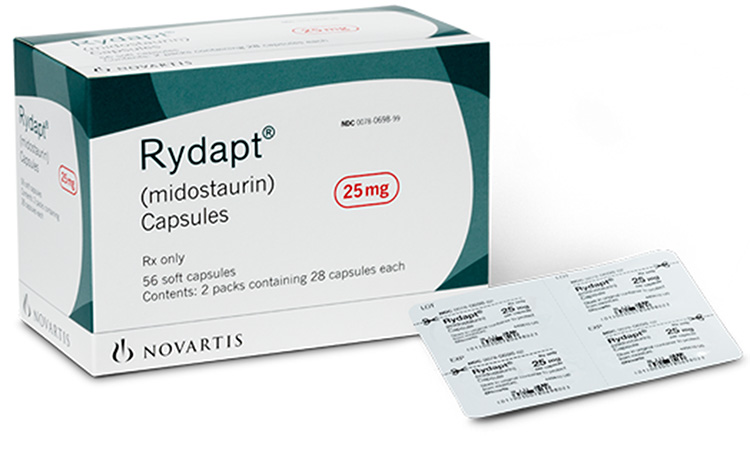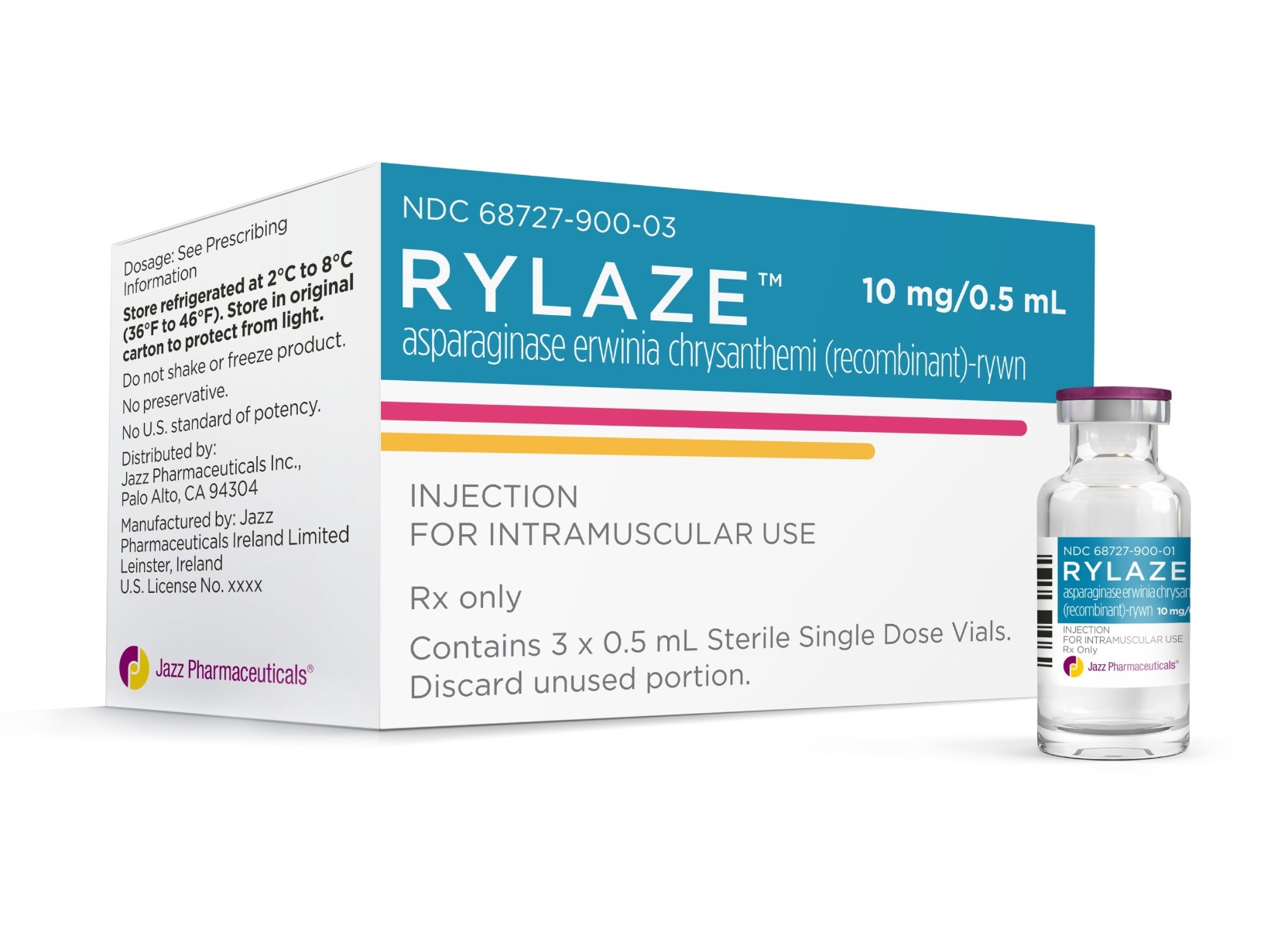Rydapt (midostaurin) vs Rylaze (asparaginase erwinia chrysanthemi (recombinant)-rywn)
Rydapt (midostaurin) vs Rylaze (asparaginase erwinia chrysanthemi (recombinant)-rywn)
Rydapt (midostaurin) and Rylaze (asparaginase erwinia chrysanthemi (recombinant)-rywn) are used for different types of blood cancers and have distinct mechanisms of action. Rydapt is a kinase inhibitor used to treat acute myeloid leukemia (AML) with a specific genetic mutation and is often given in combination with chemotherapy. Rylaze, on the other hand, is an asparagine-specific enzyme used to treat acute lymphoblastic leukemia (ALL) and is used to deprive cancer cells of the amino acid asparagine, which is necessary for their growth. The choice between these medications would depend on the specific type of leukemia a patient has, the presence of particular genetic mutations, and the overall treatment plan determined by a healthcare provider.
Difference between Rydapt and Rylaze
| Metric | Rydapt (midostaurin) | Rylaze (asparaginase erwinia chrysanthemi (recombinant)-rywn) |
|---|---|---|
| Generic name | Midostaurin | Asparaginase erwinia chrysanthemi (recombinant)-rywn |
| Indications | Acute Myeloid Leukemia (AML), Mastocytosis | Acute Lymphoblastic Leukemia (ALL) |
| Mechanism of action | Protein kinase inhibitor | Asparagine hydrolysis |
| Brand names | Rydapt | Rylaze |
| Administrative route | Oral | Intramuscular |
| Side effects | Nausea, vomiting, headache, petechiae | Allergic reactions, hyperglycemia, pancreatitis |
| Contraindications | Hypersensitivity to midostaurin or excipients | Hypersensitivity to E. coli-derived asparaginase |
| Drug class | Kinase inhibitor | Enzyme |
| Manufacturer | Novartis Pharmaceuticals Corporation | Jazz Pharmaceuticals, Inc. |
Efficacy
Rydapt (midostaurin) Efficacy in Leukemia
Rydapt, known generically as midostaurin, is a kinase inhibitor approved by the U.S. Food and Drug Administration (FDA) for the treatment of adult patients with newly diagnosed acute myeloid leukemia (AML) that is FLT3 mutation-positive, as detected by an FDA-approved test. Midostaurin is used in combination with standard cytarabine and daunorubicin induction and cytarabine consolidation. The efficacy of Rydapt was established in a randomized, double-blind, placebo-controlled trial (RATIFY) in patients with AML and FLT3 mutations. Patients who received Rydapt in combination with chemotherapy demonstrated a significant improvement in overall survival compared to those who received chemotherapy alone. The median overall survival was 74.7 months for patients treated with midostaurin compared to 25.6 months for those treated with placebo.
Rydapt has also shown efficacy in treating advanced systemic mastocytosis, including aggressive systemic mastocytosis, systemic mastocytosis with associated hematological neoplasm, and mast cell leukemia. However, its primary use in leukemia is for AML with the FLT3 mutation, where it has made a significant impact on extending survival rates and improving patient outcomes when used as part of a combination therapy regimen.
Rylaze (asparaginase erwinia chrysanthemi (recombinant)-rywn) Efficacy in Leukemia
Rylaze, also known as asparaginase erwinia chrysanthemi (recombinant)-rywn, is an asparagine specific enzyme indicated as a component of a multi-agent chemotherapeutic regimen for the treatment of acute lymphoblastic leukemia (ALL) and lymphoblastic lymphoma (LBL) in adult and pediatric patients who have developed hypersensitivity to E. coli-derived asparaginase. Rylaze is designed to provide an alternative for patients who are unable to continue using the native E. coli asparaginase due to allergic reactions. The drug's efficacy was primarily demonstrated in a clinical trial that included patients with ALL or LBL who were either hypersensitive to E. coli-derived asparaginase or had silent inactivation.
In the clinical trial, Rylaze maintained nadir serum asparaginase activity levels above the threshold believed to be therapeutic, which is 0.1 IU/mL, when administered intramuscularly every 48 hours or every 72 hours. Maintaining such activity levels is crucial for the depletion of circulating asparagine, which is necessary for the anti-leukemic effects of asparaginase therapy. Rylaze's ability to sustain therapeutic enzyme activity levels and provide a continued treatment option for patients who have developed hypersensitivity to other asparaginase products makes it a valuable addition to the treatment landscape for ALL and LBL.
Regulatory Agency Approvals
Rydapt
-
European Medical Agency (EMA), European Union

-
Food and Drug Administration (FDA), USA

-
Health Canada

-
Therapeutic Goods Administration (TGA), Australia

-
Medsafe (NZ)

Rylaze
-
Food and Drug Administration (FDA), USA

Access Rydapt or Rylaze today
If Rydapt or Rylaze are not approved or available in your country (e.g. due to supply issues), you can access them via Everyone.org.
How it works

Make an enquiry
Choose the medicine you want to buy, answer a couple of questions, and upload your prescription to speed things up. We’ll get back to you within 24 hours.


Make an enquiry
Choose the medicine you want to buy, answer a couple of questions, and upload your prescription to speed things up. We’ll get back to you within 24 hours.


Breeze through the paperwork
We'll guide you through the required documents for importing unapproved medicine, ensuring you have all the necessary information.


Get a personalized quote
We’ll prepare a quote for you, including medicine costs and any shipping, administrative, or import fees that may apply.


Receive your medicine
Accept the quote and we’ll handle the rest - sourcing and safely delivering your medicine.

Some text on this page has been automatically generated. Speak to your physician before you start a new treatment or medication.
Let's talk
If you have any questions, call us or send us a message through WhatsApp or email:
Contact us




